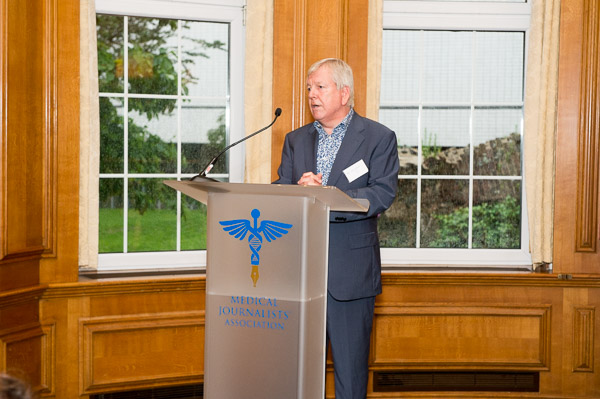
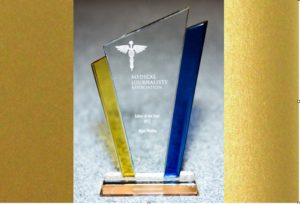 2020 has been anything but normal and sadly the highlight of our calendar, the MJA Awards Ceremony was a virtual event this year which you can watch on our website.
2020 has been anything but normal and sadly the highlight of our calendar, the MJA Awards Ceremony was a virtual event this year which you can watch on our website.
Nevertheless, our awards have once more demonstrated that health and medical journalism is alive and kicking. Your entries came in before the start of the Covid pandemic so don’t reflect your excellent reporting on that epochal catastrophe. But they do show the breadth, depth and excellence of UK health and medical journalism. Congratulations to all our winners, highly commended and finalists and thanks to our sponsors and our hard working judges.
Lawrence McGinty, Chair MJA
The winners of the MJA Awards 2020 are…
Charity Writer or Broadcaster of the Year
For the best written, visual or audio communications for a charity publication or website.
Winner: Sarah Brealey
British Heart Foundation magazine Heart Matters: Healing Words
Judges said this entry encompasses all that is important for a charity entry; a powerful case history, identification of a solution to help recovery, ie writing, which worked, third party endorsement and tips to help others.
Blogger of the Year
This could be posts from a personal blog or posts written for a blogging platform. The judges were looking for evidence of a blogger’s impact, reader engagement, online hits, and reader feedback. Entrants could submit three examples of work.

Laura Buckley
Winner: Laura Buckley
A personal blog: Mum Does Drugs; Chemist & Druggist online: Frustrations of a mother and community pharmacist. Blog Post 1 Blog Post 2 Blog Post 3
Judges praised Laura for pitching her pieces perfectly for her audience. They said she writes both clearly and emotionally so that she can make an important point while also encouraging the reader to feel along with her.
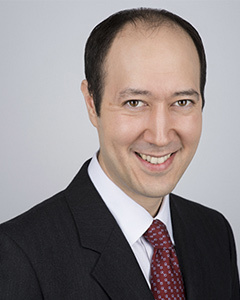
Daniel Sokol
Highly Commended: Daniel Sokol
BMJ.com; Doctors on Social Media.com: Views of a London-based bioethicist and lawyer specialising in medical law. Blog Post 1 Blog Post 2 Blog Post 3
Judges said Daniel is willing to choose a difficult subject and argue with passion a position that not all readers are going to agree with. In a field where open debate is vital to progress, dissenters like Daniel are essential.
Podcast of the Year

Elisabeth Mahase

Duncan Jarvies
Winning Team: Elisabeth Mahase (clinical news reporter), Duncan Jarvies (multimedia editor)
BMJ: “Thoroughly and deliberately targeted”: bombarded doctors in Syria hold on to hope for the future
Judges considered this a powerful podcast – and a brave choice of subject as its intention was to engage a broad audience – which it successfully did. Excellent editing, as well as the content, made the podcast compelling and showed journalism at its best.
Newcomer of the Year
Entrants who have been working in health and medical journalism for under 36 months
Winner: Eleanor Hayward
Daily Mail: HRT shortage
Judges said Eleanor made a big impact by her skilful handling and development of this important story. Her writing is excellent, addressing difficulties encountered by manufacturers, wholesalers, retailers, clinicians and above all the women whose HRT is disrupted.
Regional Reporter of the Year
Winner: Matthew Hill
The 9, BBC Scotland: Pesticide
Judges thought this an outstanding piece of investigative journalism, which began life as a regional news piece and went on to be broadcast to an international audience. This journalist has shown great skill and tenacity in bringing the untold story about the life-saving work of University of Edinburgh Professor Michael Eddleston to a global audience.
Mental Health Story of the Year
Supported by Edelman
News, feature or broadcast package on mental health issues.
Marjorie Wallace, Chief Executive, SANE and a judge for this category said. Having spent most of my career as an investigative writer, I was delighted with this year’s entries, which show that true campaigning journalism still thrives
Winner: Paul Kelso (correspondent), Rachel Lucas (producer), Emily Dumas (editor)
Sky News: The Price of Care: Children’s Mental Health
Judges thought Paul’s piece a prime example of campaigning broadcasting at its best, highlighting the shocking way in which we fail to treat children and young people with mental illness. The use of poignant case studies, blended with well-researched statistics, achieved its intended impact
Highly Commended: Nick Triggle with data analysis by Clara Guibourg, Ed Lowther and Oliver Price
BBC website, radio and TV news: Hidden mental health waits ‘leave mental health patients in limbo’
Judges thought Nick responsive, reliable and balanced in his coverage and an important contributor in the field of mental health. His good judgement is again on show in this report.
The Dr David Delvin Award for sex and sexual health journalism
Supported by Christine Webber
Awarded for an article, TV or radio programme that gives good information about sex and sexual health for the general reader/viewer. It is in memory of Dr David Delvin made possible by the support of his widow Christine Webber.
Winner: Jonathan Gibson
BBC Inside Out BBC Birmingham: the backstreet trade in STi treatments
Judges praised this as “A great stigma busting expose”, an excellent piece of investigative journalism exposing the illegal and unlicensed trade in drugs to treat a stigmatised illness. Not only does Johnathan explain the embarrassment that makes people resort to buying medication online but then does the serious leg work to catch the criminals.
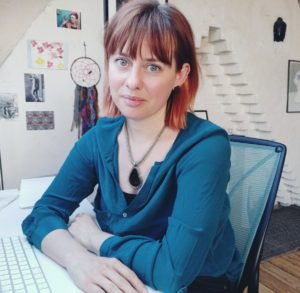
Franki Cookney
Highly Commended: Franki Cookney
MEL magazine: It’s Time to Ditch the Entire Concept of ‘Foreplay’
Judges said Franki brings clarity and humour to stigmatised and difficult subjects, writing with compassion and bringing unheard voices to the fore. This piece explores and challenges the “timetable” of traditional penetrative sex and the role of foreplay deftly and convincingly
Feature of the Year (specialist audience)
Judges said the standard was not just high but very high. There was lots of painstaking, thorough reporting, and some strong colour writing, laced with human interest in these entries, and about issues that really matter. Any one of the finalists would have been a worthy winner.
Winner: Jessica Hamzelou
New Scientist: Bad Medicine
Judges thought this piece much subtler than just a questioning of the pharmaceutical industry’s obvious interest in swift approval and widespread sales. It acknowledges the demand from desperate patients for the new and effective, and the understandable desire of some clinicians to do something rather than nothing.
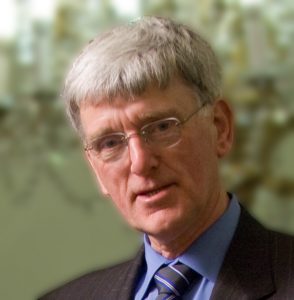
John Illman
Highly Commended: John Illman
British Journalism Review: Trust me, I write about doctors
Judges thought this piece distilled the wisdom of several decades spent in almost all aspects of medical journalism. It spells out the lessons learnt, errors made, pitfalls to avoid, and challenges faced. It is an excellent, and witty, short primer for anyone starting out in medical journalism.
Highly Commended: Liz O’Riordan
ecancer Journal: Reflections from a breast surgeon with breast cancer on how to improve cancer care
Judges said: Liz’s piece is in a long and honourable tradition of doctors seeking to explain to doctors just what it is like to be a patient, and how little clinicians can know, despite their daily calling. The experience put Liz, despite her knowledge, through the emotional wringer, and her piece does that to the reader.
Feature of the Year (broadcast)
Supported by MSD
Winning Team: Lesley Curwen (presenter), Fiona Hill (producer)
BBC Radio Science production for BBC Radio 4: Stem Cell, Hard Sell
Judges said this made them gasp out loud at times, it was a really interesting programme, well researched and with interesting interviewees.
Feature of the Year (general audience)
Winner: Matt Rudd
The Sunday Times Magazine: The Hidden Epidemic
Judges were impressed with how well Matt set out the health challenge with compelling statistics and authoritative interviews and quotes. They praised the quality of writing and the strength of Matt’s argument and the hopeful and positive message the feature conveys to diabetics about changing their behaviours.

Aasma Day
Highly Commended: Aasma Day
HuffPost UK: Crisis Engulfing the NHS – Seen From One Hospital Bed
Judges said this was a beautifully written and illustrated feature blending the perspectives of national leaders with the daily reality of people on the frontline citing staff shortages, failed targets and poor planning.
News Story of the Year (specialist audience)
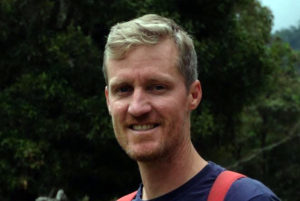
Nick Bostock
Winner: Nick Bostock
GP Online: Harassment, exclusion and innuendo: women frozen out by ‘sexist BMA culture’
Judges said this was investigative journalism at its very best. Seizing on random comments on Twitter this wide-ranging follow-up exposed an unedifying culture of sexism; revelations which prompted an independent inquiry that made 31 recommendations for change, all of which are being implemented.
Highly Commended: Lawrence Dunhill, Nick Carding
Health Service Journal: Exclusive: Capital billions promised by ministers fail to reach ‘front line’
Judges praised “good, hard graft” as being the key to this compelling story revealing that only a tiny fraction of government claims to be boosting capital spending in the NHS has resulted in money reaching the front line. A tenacious investigation based on forensic analysis of reports and accounts and effect use of freedom of information requests.
News Story of the Year (broadcast)
Supported by Roche

Rachael Buchanan
Winning Team: Rachael Buchanan (producer/director) Fergus Walsh (correspondent) Julius Peacock (cameraman and editor) Tony Fallshaw (cameraman) Joanne McDonald (graphics)
BBC Six O Clock News: Separation of conjoined twins Safa and Marwa
Judges described this as a brilliant piece of journalism, particularly in its breadth and depth. It tackled stories across the human as well as the medical, science and ethical issues. It was also a great coup to gain access to the separation of conjoined twins. Beautifully shot, great graphics and precisely scripted.
A follow up on the conjoined twins story ran on the BBC in October and can be seen here https://www.bbc.co.uk/news/health-54385415
Highly Commended: Charlotte Lomas-Farley (correspondent) Rachel Lucas (producer)
Sky News: Deaths in Care
Judges said this was proper journalism on an unsexy subject sustained over many months. This commitment is increasingly hard to do and reporters and news organisations who do this kind of work need to be recognised.
News Story of the Year (general audience)
Supported by Boehringer Ingelheim

Shaun Lintern
Winner: Shaun Lintern
The Independent: ‘Largest maternity scandal in NHS history’: Dozens of mothers and babies died on wards of hospital trust, leaked report reveals
Judges thought this was a really important story and a proper exclusive that all the other papers followed up – no doubt gained by old fashioned determination and contacts.
Case Study of the Year
Winning Team: Dominic Hughes (correspondent), Lesley Day (producer), John Boon (editor)
BBC 1 TV Six o’clock News: Motor Neurone Disease
This BBC News piece by Dominic Hughes on a new research study into Motor Neurone Disease is an example of compassionate and informative reporting at its best. Judges commended the main case study for revealing with painful clarity the huge sense of loss, despair and tragedy the illness brings to its sufferers and their families. The BBC team’s piece provides the viewer with a slim hope that repurposing existing drugs to fight MND may offer some progress in the fight against this devastating condition.

Aasma Day
Highly Commended: Aasma Day
HuffPost UK: This Young Woman Was Told To ‘Go Back Home’ For Using A Disabled Toilet
Judges commented that Aasma’s feature does what all case-history articles should do – give us genuine insight into what it feels like to be the person at the centre of the story. The young woman in question has Crohn’s disease and her ‘invisible disability’ leads to criticism and a lack of support and understanding in all manner of situations – not least when using a disabled toilet.
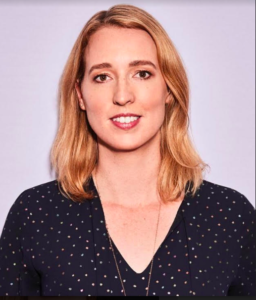
Amy Packer
Highly Commended: Amy Packer
Daily Express: It’s such a euphoric feeling to think I haven’t got cancer anymore
Judges considered this an excellent piece about tongue tumours featuring a male radio presenter whose voice was threatened by the illness and the inevitable surgery. It highlights the physical and mental trauma of cancer and provides a powerful message to all of us, particularly men, not to ignore the growth of lumps or cysts.
Science Explained
Supported by Wiley
Judges were looking for complex and emerging science stories made clear for a lay or specialist audience. Matching explanation to audience was vital.

Clare Wilson
Winner: Clare Wilson
New Scientist: The only food advice you need
Judges praised Clare’s skill in explaining both the science and the scientific process which would appeal to her audience. She wrote to her audience’s level of knowledge perfectly and conveyed possible negatives of the scientific process in a positive, engaging way.

Slavea Chankova
Highly Commended: Slavea Chankova
The Economist: Attack of the superbugs
Judges said this was a compelling article. The level of detail was well thought out, inventing patients and their quotes, it brought a new angle to a well-known subject.
Freelance of the Year
Entrants submitted three pieces of work
Winner: Caroline Scott
For her work published in the Good Health section of the Daily Mail. Article 1 Article 2 Article 3
Judges said these were three very strong well-written stories on a wide range of topics. Caroline tackles subjects with great sensitivity and compassion through compelling and beautifully written pieces.
Editor of the Year
Supported by Seqirus
This category is for editors of publications, health pages/sections, websites, or sections of larger websites. Entrants had to supply evidence of both their personal impact and their title’s, and the achievements of which they were proudest. Three pieces of work could be submitted.
Winner: Jaimie Kaffash
Editor, Pulse (Cogora) Item 1 Item 2 Item 3
Judges said this was quality journalism from a small staff with limited resources. They praised the professional and clearly presented investigations into both CAMHS (Child and Adolescent Mental Health Services) and doctors’ workload. They liked the description of short staffing and long hours contrasted with the thanks and admiration they now received.
Outstanding Contribution to Health or Medical Journalism
Sponsored by Bristol-Myers Squibb, Principal Sponsor of the 2020 MJA Awards
This is the MJA’s headline award. The highest honour that can be achieved by any of our entrants.
Journalists cannot propose themselves. They are selected by our judges. After deciding on their finalists and voting for a winner, judges in each of our categories are invited to put forward the names of those they consider worthy of such an award.
Every one of the judges then has the difficult task of choosing from this list the journalist who should be given the ultimate prize.
The award recognises stories that have made waves, campaigns that have changed attitudes, coverage that has set the agenda.
This year there were three entries on the shortlist for Outstanding Contribution. The judges felt that each one was worthy of such a high accolade. But there can only be one winner..

Shaun Lintern
Winner: Shaun Lintern
The Independent: ‘Largest maternity scandal in NHS history’: Dozens of mothers and babies died on wards of hospital trust, leaked report reveals
Judges thought this was a really important story and a proper exclusive that all the other papers followed up – no doubt gained by old fashioned determination and contacts.
Winner of News Story of the Year (general audience). Supported by Boehringer Ingelheim
Finalist: Rachael Buchanan (producer/director) Fergus Walsh (correspondent) Julius Peacock (cameraman and editor) Tony Fallshaw (cameraman) Joanne McDonald (graphics)
BBC Six O Clock News: Separation of conjoined twins Safa and Marwa
Judges described this as a brilliant piece of journalism, particularly in its breadth and depth. It tackled stories across the human as well as the medical, science and ethical issues. It was also a great coup to gain access to the separation of conjoined twins. Beautifully shot, great graphics and precisely scripted.
Winners of News Story of the Year (broadcast). Supported by Roche
Finalist: Jonathan Gibson
BBC Inside Out BBC Birmingham: the backstreet trade in STi treatments
Judges praised this as “A great stigma busting expose”, an excellent piece of investigative journalism exposing the illegal and unlicensed trade in drugs to treat a stigmatised illness. Not only does Johnathan explain the embarrassment that makes people resort to buying medication online but then does the serious leg work to catch the criminals.
Winner of the Dr David Delvin Award for sex and sexual health journalism. Supported by Christine Webber
The MJA Award for Excellence in PR
Supported by the Healthcare Communications Association (HCA)
An award for excellence in PR to recognise the communications teams and PR agencies who understand what journalists really want. This award is judged by a panel of journalists, with the aim of improving the standard of releases and press materials MJA members receive. Find out more.
Winner: Cystic Fibrosis Trust for their campaign to make the public aware of the injustice of a four year wait for drugs that could save thousands of lives.
Judges said that in a field of strong entries, this one stood out. A sustained campaign over many months, deploying every weapon in the armoury – demonstrations, petitions, celebrities – to keep focus on the desperate needs of one group of patients. Nimble, committed, it gave journalists what they wanted – a good story.
See the full list of finalists in the MJA Awards 2020
Find out more about the MJA Awards, Categories and Entry Criteria
List of Judges of the MJA Awards 2020
Adam Brimelow , Director of communications NHS Providers; previously BBC health correspondent
David Brindle, Public services editor, the Guardian
Jerome Burne, Health journalist and campaigner
Claire Burroughs, Director of communications, policy and research, Royal College of Physicians
Peter Carter, Independent healthcare consultant and former CEO, Royal College of Nursing
Catherine Collins, Registered dietitian, media spokesperson for the British Dietetic Association
Rosalind Dewar, Media manager, Royal Society of Medicine
Natasha Donovan, Communications director HappytoHealthYou
Genevieve Edwards, Chief executive, Bowel Cancer UK
Paul Farmer, Chief executive MIND
Helene Feger, NHS director of strategy and comms for digital transformation
Richard Frediani, Editor BBC Breakfast
Bonnie Green, Consultant/ patient involvement/engagement volunteer: former health/voluntary sector public affairs
Christine Hancock, Founder and director, C3 Collaborating for Health
Nigel Hawkes, Former science editor and health editor at The Times.
Jon Hibbs, Director of communications and engagement, Barts Health NHS Trust
Nicola Hill, MJA executive committee member
Jenny Hope, Former medical correspondent of the Daily Mail and co-partner of RNA Media training and consultancy in science and health.
Tim Irish, Acting chair at NICE – National Institute for Health and Care Excellence
Anna Jefferson, Head of Media, Care Quality Commission
Paul Johnson, Freelance health journalist
Louise Jury, Director of communications, Screenskills – the industry-led skills charity for UK screen industry
Sophie Lane, Senior communications officer, Sense about Science
Lawrence McGinty, Chair, Medical Journalists’ Association
Glyn McIntosh, Director, Bishopsland Educational Trust, former chief executive QUIT.
Laura Milne, Editorial director, Movember Foundation; former health features editor, Daily Express
Emily Mobley, Media manager, Wellcome Sanger Institute
Clare Murphy, Director of external affairs, British Pregnancy Advisory Service
Vivienne Nathanson, Chair of Nathanson Health Associates
Kerry Noble, Communications consultant in medicine and science
Susan Osborne, Director of communications, The Goodwork Organisation
Nigel Praities, Executive Editor, Pharmaceutical Journal
Mark Purcell, Managing director Jonathan Street PR, health communicators
Daniel Reynolds, Director of communications, NHS Confederation
Jennifer Richardson, Features editor, The BMJ; journalism lecturer, Kingston University
Genevieve Robson, Co-founder and senior writer at Streaming Well, video for healthcare
Lee Rodwell, Health writer and author
Lois Rogers, Former health editor, Sunday Times
Barbara Rowlands, Hon research fellow in journalism. City, University of London.
Nick Samuels, Director of healthcare, Freshwater UK
Kate Sidwell, Voluntary sector communications consultant & PR.
Michele Simmons, Health journalist, editorial consultant and author
Matt Tee, Chief executive, Independent Press Standards Organisation.
Nicholas Timmins, Former public policy editor, Financial Times; senior fellow at The King’s Fund and Institute for Government
James Titcombe, Ambassador Baby Lifeline; Associate editor, Journal of Patient Safety and Risk Management
Liz Vercoe, Former associate editor Sunday Mirror magazine
Marjorie Wallace, Chief executive SANE
Christine Webber, Freelance writer and broadcaster
Kate Wighton, Research media manager, Imperial College London.









Recent Comments